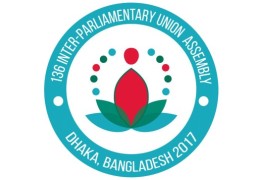
“Elimination of world poverty is unlikely to be achieved unless the rights and needs of people with disabilities are taken into account,” said National Assembly House Chairperson on International Relations, Ms Mmatlala Boroto during the 136th Inter-Parliamentary Union (IPU) Assembly in Bangladesh this week.
She said people living with disabilities were, more often, among the poorest of the poor as they are caught in a vicious cycle of discrimination, poverty and disability, each being both a cause and consequence of the other.
“Our White Paper on the Rights of Persons with Disabilities recognises that persons with disabilities must be afforded equitable rights as all other people in society to enable their full participation in the life of society. This includes the right to education, healthcare, housing, food security and family life,” she told the world parliamentarians gathered in Dhaka, the capital city of Bangladesh.
She added that poverty has also had a gender dimension with African women, particularly those in rural areas, bearing the brunt of extreme poverty.
“The lack of rights for the African woman to inherit property of her family continues to add a burden to the suffering of the African woman. The empowering of rural women to have access to productive assets, including land, credit, inputs and financial services will go a long way to reduce the levels of poverty in the world. The girl child must be freed from all forms of discrimination and oppression, including cases where young girls are forced into child marriages,” said Ms Boroto.
She said the struggle against poverty and inequality must be waged by all, and made reference to Goal One of the SDGs (Sustainable Development Goals), that calls for an end to poverty in all its manifestations by 2030.
“It also aims to ensure social protection for the poor and vulnerable, increase access to basic services and support for people harmed by extreme climate-related events and other social, economic and environmental shocks and disasters.
“It is with recognition that Mr Nelson Mandela emphasised that ‘overcoming poverty is not a gesture of charity. It is an act of justice. It is the protection of a fundamental human right, the right to dignity and a decent life. While poverty persists, there is no true freedom’. Our country has constructed a National Development Plan (NDP) which gears us towards eliminating poverty and reducing inequality by 2030,” she said.
The House Chairperson also drew comparisons between South Africa’s NDP, the United Nations’ SDGs and the African Union’s Agenda 2063, which she said have one core feature as their premise, “to enhance the lives of people affected by harsh contradictions of our world”.
“The NDP asserts that the survival of any political democracy is not possible if the masses of our people remain in poverty, without access to land and without a tangible prospect for a better life. Attacking poverty and deprivation should therefore be the first priority of the South African democratic government.
“We can only succeed if we are able to eradicate all forms of racial discrimination as they manifest themselves with the ownership and control of the economy, without such decisive reversal of these patterns of economic domination, any kind of transformation will be superficial. Similarly, if poverty and inequality are reduced without demonstrably changed ownership patterns, the country’s progress will be turbulent and tenuous,” she said.
The theme for the 136th IPU Assembly is: “Redressing inequalities: Delivering on dignity and well-being for all” and the conference deliberated on the following topics:
- Sharing our diversity: The 20th Anniversary of the Universal Declaration on Democracy.
- Act now for adolescent: The role of the parliamentarians in promoting adolescent health and wellbeing.
- The role of parliamentarians in preventing outside interference in the internal affairs of sovereign states.
- Promoting enhanced international cooperation of the SDGs, in particular on the financial inclusion of women as drivers of development.
The IPU provides Members of Parliament a platform to advance South Africa's position on global topical matters. It also affords South Africa an opportunity to further Africa's position to effectively ensure socio-economic development for the continent.
By Sakhile Mokoena
4 April 2017

